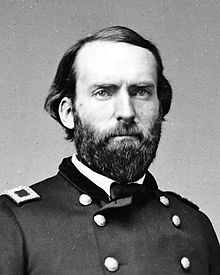David Sloane Stanley
| David Sloane Stanley | |
|---|---|

Maj. Gen. David S. Stanley
|
|
| Born |
June 1, 1828 Cedar Valley, Ohio |
| Died | March 13, 1902 (aged 73) Washington, D.C. |
| Place of burial | United States Soldiers' and Airmen's Home National Cemetery, Washington, D.C. |
| Allegiance |
United States of America Union |
| Service/ |
United States Army Union Army |
| Years of service | 1852–1892 |
| Rank |
|
| Commands held |
IV Corps 22nd U.S. Infantry |
| Battles/wars | |
| Awards |
|
David Sloane Stanley (June 1, 1828 – March 13, 1902) was a Union Army general during the American Civil War. After taking part in the liberation of the Upper Mississippi, and serving at Corinth and Stones River, he was made a corps commander under Sherman and sent to Tennessee to oppose John Bell Hood's Army of Tennessee. At a critical moment in the Battle of Franklin (November 1864), he saved part of George D. Wagner’s division from destruction, earning America's highest military decoration, the Medal of Honor. Later he explored the Yellowstone River, and his favourable reports encouraged settlement of this region.
Stanley was born in Cedar Valley, Wayne County, Ohio. He graduated from West Point in 1852 and went to the Western frontier to survey railroad routes. He engaged in Indian fighting and was promoted to captain in March 1861, shortly before the outbreak of the Civil War. Stanley was on duty at Fort Washita in Indian Territory when war broke out. He led his men to Fort Leavenworth, Kansas.
He fought at several battles in Missouri, including the Battle of Wilson's Creek, where he guarded the supply trains. President Abraham Lincoln appointed Stanley as brigadier general September 28, 1861, although the U.S. Senate did not confirm the appointment until March 7, 1862. Fighting in the Western Theater, he participated in the operations against New Madrid, Missouri and the Battle of Island Number Ten. He was involved in numerous major battles, including the Second Battle of Corinth, where he commanded a division of infantry of the Army of the Mississippi, and the Battle of Stones River, in which he led the cavalry of the Army of the Cumberland. On March 11, 1863, Stanley was appointed major general to rank from November 29, 1862. Stanley also led the Union cavalry in the Tullahoma Campaign. He fell ill late in 1863 and missed the Battle of Chickamauga. In 1864, he fought under William Tecumseh Sherman as a division commander in the IV Corps of the Army of the Cumberland during the Atlanta Campaign, and he was promoted to command of the corps when Maj. Gen. Oliver O. Howard was named commander of the Army of the Tennessee. After the capture of the city, instead of employing him marching to the sea, Sherman dispatched Stanley and his IV Corps to Tennessee to help protect the state from invasion by John Bell Hood's Army of Tennessee.
...
Wikipedia
